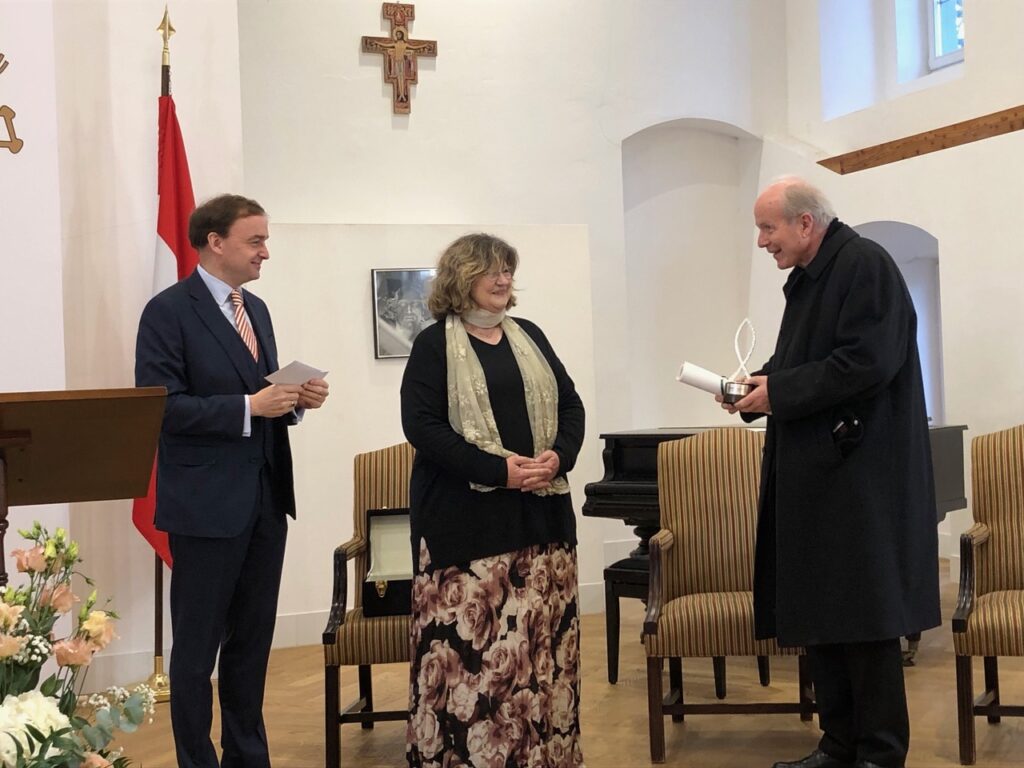As every year, a special prize for evangelization will be awarded to an institution or a person who improves the world and spreads the Word through their activities. This year’s winner is:
ITI Catholic University, Trumau (Austria)
Card. Christoph von Schönborn (Grand Chancellor)
Event details
CAPAX DEI AWARD
To the ITI Catholic University – TRUMAU – Riley Hall
3rd of December 2022
11:00 am – Presentation of Mirabile Dictu – International Catholic Film Festival, its role in the Church and its purpose
11:30 am – The Cardinal, on behalf of the ITI, is rewarded with the Silver Fish and a donation for the ITI by Ms. Liana Marabini
12:00 am – Cocktail Buffet offered by Mirabile Dictu to students, staff and Faculty of the ITI

Mission Statement

The Katholische Hochschule ITI rests on four pillars.
The first is the founding intention of Pope John Paul II. The ITI was founded for the study of Catholic theology as a unified whole within which particular attention is devoted to the theme of marriage and the family. A solid theological formation is needed for Catholic leaders, lay and clergy, to achieve critical judgment in our culture and the capacity to contribute to the new evangelization, which is especially needed in the area of marriage and the family.
The second pillar of the ITI, also part of John Paul II’s founding vision, is its international character, its bridge function between East and West. Students come from Central and Eastern Europe, from Western Europe, the Americas and the rest of the world. This international character allows a genuine experience of the universal Church, which must “breathe with both lungs” (John Paul II) East and West.
The third pillar of the ITI is its pedagogy, which consists in studying the original writings of the great Masters of Theology, in addition to Sacred Scripture, especially the Fathers and the Doctors of the Church. Contact with original texts develops an eye for quality, especially in theology. The great masters lead faculty and students most directly to the realities discussed in theology, above all God himself. This pedagogy also develops the virtues of active reading, attentive discussion and penetrating understanding.
The fourth pillar of the ITI is a rich Catholic community that lives and prays together in the same place and its close vicinity. The example of the Christian family life lived by many among the faculty and students offers the most persuasive and practically helpful evidence of the beauty and practicability of that life. It also encourages the formation of religious and priestly vocations and their blossoming.
It is the simultaneous presence of these four pillars that constitutes the strength of the ITI.
History

In the 1990s, Pope St. John Paul II asked the Austrian bishops if they could start a Catholic theological institute to address certain concerns: the crisis in marriage and the family throughout the world, theological formation of students from former Soviet-bloc countries, and building an understanding between East and West, including the Eastern and Western traditions of the Church. The Austrian bishops agreed and the Holy See appointed Archbishop Dr. Christoph Schönborn, O.P. as Grand Chancellor and the International Theological Institute (ITI) was born.

During the first academic year, Archbishop Schönborn, asked an old acquaintance of his from Salzburg, DDr. Michael Waldstein, then a recently tenured professor at Notre Dame University in the United States, if he would consider leaving his position for that of Founding President of the ITI. Michael Waldstein responded affirmatively and asked another person on the teaching staff of Notre Dame to join him in this pioneer venture, namely Walter J. Thompson, who became the institute’s first Vice-President. Together with the assistance of Archbishop Schönborn they put together the curriculum. In 2006 Dr. Waldstein was succeeded as President by Msgr. Dr. Larry Hogan, who had himself served the ITI as Vice-President since 1998. He was in turn succeeded by Dr. Christiaan Alting von Geusau in 2014.

The first students came in 1995 to the ITI campus in Gaming, Austria, called the Kartause, to begin classes. The Kartause is a former Carthusian Monastery founded in 1330 by Albrecht II, Duke of Austria. They shared a campus with the Franciscan University of Steubenville which has a Study Abroad program there.

In January of 1997, on the Feast of St. Thomas Aquinas, the ITI received a message from Pope St. John Paul II in honor of its birth and official opening. That year the ITI saw its first graduating class – three students!

The ITI continued to grow – mostly by word of mouth from satisfied students who came not only to study theology, but to live it. Students have come from: Albania, Australia, Austria, Belarus, Brazil, Bulgaria, Cameroon, Canada, China, Croatia, Czech, Denmark, Estonia, Georgia, Germany, Hungary, India, Ireland, Italy, Latvia, Lithuania, Mexico, Moldava, the Netherlands, New Zealand, Nigeria, Poland, Romania, Russia, Slovakia, Slovenia, Ukraine, the United Kingdom, and the USA.

The ITI needed room to grow and so in 2009 the campus was moved to Trumau, near Vienna, Austria. Trumau was founded as part of the land deeded to Heiligenkreuz Abbey by Duke Leopold IV. The classrooms, library and administration offices are housed in the Trumau Schloss which was built in 1138.
Currently, graduating classes have about 30 students with diplomas in Sacred Theology Masters (STM), Sacred Theology Licentiate (STL), Sacred Theology Doctorate (STD), Master of Marriage and Family (MMF), or a certificate in our one year Studium Generale (SG). The success of their studies can be seen in the wonderful work alumni are doing in the Church and in the world.
The ITI began offering a three-year Bachelor in Liberal Arts in September 2018.